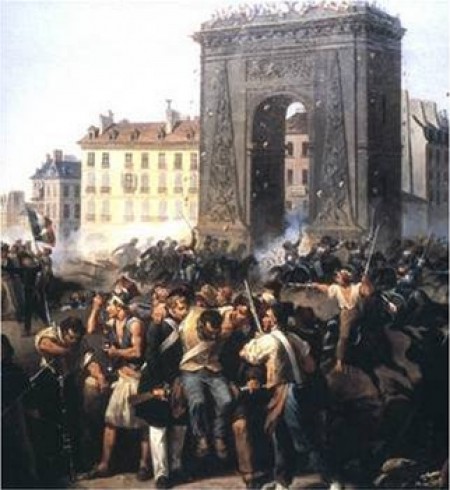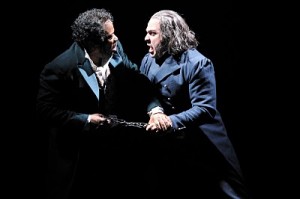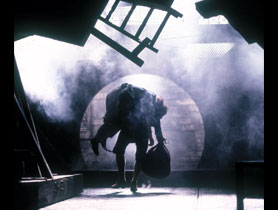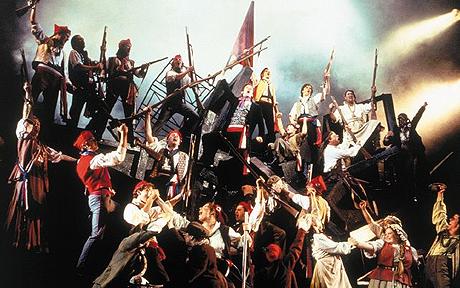Tickets to the London west-end show available from Amazon local: click here
Les Misérables (1862) by Victor Hugo
Les Misérables is a novel of towering stature, a dazzling illustration of early nineteenth century France, firmly in the ‘must read before I die’ category of world literature.

It has a depth of vision, underlying truth, moments of moving compassion, almost to the point of melodrama, but with a morality and a social conscience ahead of its time. If there is a problem, it is one of scale. How do you find the time to read, and absorb, over 1200 pages? In addition, Victor Hugo was anxious to put into the novel everything he researched about the entire period, and can digress at will. There is little doubt that it was his intention the book was more than a historical novel, and a knowledge of French history helps the reader follow the motives and intentions of Hugo’s fictional characters…
The implication of the novel is not simply a development of the characters and the ills that befall them, but also to make a statement about his beloved country and mankind at large. The notion of improvement, with all the connotations of the age, is illustrated by Valjean’s redemption, and the orphan Cosette’s progress to Marius’ bride. It is also apparent in the progress of France, the themes of justice and social welfare, the increasing awareness of the ever-present gap between rich and poor. The contrasts are obvious, good and evil, right and wrong, but Hugo excels in the complications of chance and character, moral necessity and pragmatism, the value and power of the conscience. Hugo himself remarked, “as long as there is misery, injustice and destitution there will be a need for my book.”
Who are the misérables? Clearly denoted are those outcasts forced by circumstances to live in misery, ignorance and hunger, the poor and the destitute, living outside of respectability. They include thieves, pickpockets and prostitutes, as well as the tramps, outcasts, rag-pickers and others. In 1830’s Paris, they used their own language, the argot, and customs. The menace, real or imagined, they represented to Parisian society is an integral part of the novel.
Les Misérables has of course, been adapted for stage with the hugely successful musical by Alan Boublil and Claude Michel Schonberg, and lyrics by Herbert Kretzner. Inevitably much has been omitted. Perhaps less obvious is the way characters such as the Thénardiers have been reduced from irredeemable villains to roguish clowns, although the musical numbers Master of the House and Beggars at the Feast are deservedly highlights of the show. Valjean of the novel is a far more complex character; the show depicts little of the tension, little of the conflict between his hard won familial feelings for Cosette and his growing jealousy as he sees Marius fall in love with her.
The following abridgment, in 3300 words, is intended to impart a little of the flavour of the novel, and for those who have enjoyed the musical, to add detail to the story. Let me know if I can improve it.
Early in October 1815, at the close of the afternoon, a man came into the little town of Digne. He was on foot, and the few people around looked at him suspiciously. The traveller was of wretched appearance, though stout and robust, and in the full vigour of life. He was evidently a stranger, and tired, dusty, and wearied with a long day’s tramp.
Neither of the two inns in the town would give him food or shelter, though he offered good money for payment.
He was an ex-convict, and that was enough to exclude him. So in despair he went to the prison, and asked humbly for a night’s lodging, but the jailer told him that was impossible unless he got himself arrested first.
It was a cold night and the wind was blowing from the Alps; it seemed there was no refuge open to him. Then as he sat down on a stone bench in the market-place and tried to sleep, a lady coming out of the cathedral noticed him, and learning his homeless state, bade him knock at the bishop’s house, for the good bishop’s charity and compassion were known throughout the neighbourhood.
At the man’s knock, the bishop said “Come in,” and the ex-convict entered. The bishop, Monseigneur Myriel, lived alone with his sister, Madame Magloire, and an old housekeeper. Their guest told them at once that his name was Jean Valjean, that he was a galley-slave who had spent nineteen years at the hulks, and that he had been walking four days since his release. “It is the same wherever I go,” the man went on, with bitterness. “They all say to me, ‘Be off!’ I am very tired and hungry. Will you let me stay here? I will pay.”
“Madame Magloire,” said the bishop, “please lay another knife and fork. Sit down, monsieur, and warm yourself. We shall have supper directly, and your bed will be got ready while you are supping.” Joy and amazement were on the man’s face; he stammered his thanks as though beside himself.
The bishop, in honour of his guest, had silver forks and spoons placed on the table. The man ate his food with frightful voracity, and paid no attention to anyone until the meal was over. Then the bishop showed him his bed in an alcove, and an hour later the whole household was asleep.
Jean Valjean soon woke up again.
For nineteen years he had been at the galleys. Originally a pruner of trees, he had broken a baker’s window and stolen a loaf one hard winter when there was no work to be had, and for this the sentence was five years. Time after time he had tried to escape, and had always been recaptured; and for each offence, a fresh sentence was imposed.
Nineteen years for breaking a window and stealing a loaf! He had gone into prison sobbing and shuddering. He had come out full of hatred and bitterness.
That night, at the bishop’s house, for the first time in nineteen years, Jean Valjean had received kindness. He was moved and shaken. It seemed inexplicable. He got up from his bed. Everyone was asleep, the house was perfectly still.
Jean Valjean seized the silver plate basket which stood in the bishop’s room, put the silver into his knapsack, and fled out of the house.
In the morning, while the bishop was breakfasting, the gendarmes brought in Jean Valjean. The sergeant explained that they had met him running away, and had arrested him, because of the silver they found on him. “I gave you the candlesticks, too!” said the bishop; “they are silver. Why did you not take them with the rest of the plate?” Then, turning to the gendarmes, “It is a mistake.”
“We are to let him go?” said the sergeant. “Certainly,” said the bishop. The gendarmes retired.
“My friend,” said the bishop to Jean Valjean, “here are your candlesticks. Take them with you.” He added in a low voice, “Never forget that you have promised me to use this silver to become an honest man. My brother, you no longer belong to evil, but to good.” Jean Valjean never remembered having promised anything. He left the bishop’s house and the town dazed and stupefied. It was a new world he had entered.
He walked on for miles, and then sat down by the roadside to think. Presently, a small Savoyard boy passed him, and as he passed, he dropped a two-franc piece on the ground. Jean Valjean placed his foot upon it. In vain the boy implored him for the coin. Jean Valjean sat motionless, deep in thought. Only when the boy had gone on, in despair, did Jean Valjean wake from his reverie.
He shouted out, “Little Gervais, little Gervais!” for the boy had told him his name. The lad was out of sight, and hearing, and no answer came. The enormity of his crime came home to him, and Jean Valjean fell to the ground, and for the first time in nineteen years, he wept.
2
On a certain December night in 1815 a stranger entered the town of Montreuil at the very time when a great fire had just broken out in the town hall. Rushing at once into the flames, and at the risk of his own life, saved the two children of the gendarmerie captain. In consequence of this act, no one thought of asking for his passport.
The stranger settled in the town; by a happy invention he improved the manufacture of the black beads, the chief industry of Montreuil, and in three years, with very small capital, he became a rich man and brought prosperity to the place.
In 1820, Father Madeleine, for so the stranger was called, was made Mayor of Montreuil, by unanimous request, an honour he had declined the previous year. Before he came, everything was languishing in the town, and now, a few years later, there was a healthy life for all.
Father Madeleine employed everybody who came to him. The only condition he made was honesty. From the men he expected goodwill, from the women, purity. Prosperity did not make Father Madeleine change his habits. He performed his duties as mayor, but lived a solitary and simple life, avoiding society. His strength, although he was a man of fifty, was enormous. It was noticed that he read more as his leisure increased, and that as the years went by his speech became gentler and more polite.
One person only in the entire district looked doubtfully at the mayor, and that was Javert, inspector of police. Javert was the incarnation of the dutiful policeman, implacable, resolute, fanatical. He had arrived in Montreuil when Father Madeleine was already a rich man, and he felt sure he had seen him before.
One day in 1823, the mayor intervened when Javert tried to send a poor woman, Fantine, to prison. Fantine had been dismissed from the factory without the knowledge of Father Madeleine; and her one hope in life was her little girl, whom she called Cosette. Now Cosette was boarded out at the village of Montfermeil, some miles distant from Montreuil, with the Thénardier family, villainous, grasping and dishonest. Raising the money for Cosette’s keep had brought Fantine to misery and sickness.
The mayor could save Fantine from prison, he could not save her life; but before the unhappy woman died she had delivered to Father Madeleine a paper authorising him to take her child, and he had accepted the trust.
It was when Fantine lay dying in the hospital that Javert, who had quite decided in his own mind who Father Madeleine was, came to the mayor and asked to be dismissed from the service.
“I have denounced you, Monsieur le Maire, to the prefect of police at Paris, as Jean Valjean, an ex-convict, who has been wanted for the robbery of a little Savoyard boy more than five years ago.”
“And what answer did you receive?”
“That I was quite mad, for the real Jean Valjean has been found.”
Javert went on to explain that an old man had been arrested for breaking into an orchard; that on being taken to prison he had been recognized as Jean Valjean, and tomorrow he was to be tried at Arras, and that as an ex-convict, his sentence would be for life.
Terrible was the anguish of Father Madeleine that night. He had done everything a man could do to obliterate his past; and now it seemed another was to suffer in his place. The torment ended. In the morning, Father Madeleine set out for Arras.
Arriving before the orchard-breaker was condemned, he proved to the court’s astonishment that he, the revered and philanthropic Mayor of Montreuil, was the real Jean Valjean. Leaving the court, he returned to Montreuil, removed what money he had, buried it, and arranged his affairs.
A few days later, Jean Valjean was sent back to the galleys at Toulon, and with his removal, the prosperity of Montreuil speedily collapsed. That was in July, 1823. In November, the following paragraph appeared in the Toulon newspaper: “Yesterday, a convict, in rescuing a sailor, fell into the sea and was drowned. His body has not been found. His name was registered as Jean Valjean.”
3
At Christmas, 1823, an old man came to the village of Montfermeil, called at the inn, paid money to the rascally innkeeper Thénardier, and carried little Cosette to Paris.
The old man rented the attic of an old house, and Cosette became inexpressibly happy with her few playthings, and with the good man who loved her so tenderly.
Until then, Jean Valjean had never loved anything. He had never been a father, lover, husband or friend. When he saw Cosette, and he had fulfilled his promise to her mother, he felt his heart strangely moved. He poured all his affection on to this child. Jean Valjean was fifty-five and Cosette eight, and all of his life, hitherto untouched, melted into a benevolent devotion.
Cosette, too, changed. She had been separated from her mother at such an early age that she could not remember her, and the Thénardiers had been nothing but cruelty. But in Jean Valjean, she found a father, just as he had found a daughter in Cosette.
Weeks passed. They lived a happy life in the old attic. Cosette would chatter, laugh and sing all day. Jean Valjean was careful never to go out in the daytime, but he began to be known in the neighbourhood as ‘the mendicant who gives away money’. One day there was an old man sitting on some church steps, who appeared to be praying. As Jean Valjean dropped some money into his hand, the beggar suddenly raised his eyes, stared at him, then quickly turned away. Jean Valjean started, and went home greatly troubled. The face he was sure he had seen was that of Javert.
A few nights later, Jean Valjean found that the man had taken lodgings in the house where he and Cosette lived. Taking the child by the hand, he at once set out for fresh quarters. They passed through silent and empty streets, and crossed the Seine, and it seemed to Jean Valjean that no one was in pursuit. But soon he noticed four men plainly shadowing him, and a shudder went over him. He turned from street to street, trying to escape the city, and at last found himself in a cul-de–sac. What was to be done?
There was no time to turn back. Javert had covered every outlet. Fortunately, the street was in deep shadow, and their movements unseen. While he stood hesitating, some soldiers entered the street, with Javert at their head. It was evident they intended to explore every nook and corner, and he judged they would take a quarter of an hour to reach the spot where they were. It was a frightful moment. Capture meant the galleys, and losing Cosette forever. There was only one thing possible, to scale the wall which ran along a portion of the street. The only difficulty was Cosette; and there was no thought of abandoning her.
Jean Valjean found a length of rope and tied it to an unlit lamp-post. He fastened it to Cosette, then climbing the wall, he sat on the top and raised her beside him. Putting her on his back, he crawled along the wall until he came to a sloping roof. He could still hear Javert giving his orders to the patrol.
Jean Valjean slipped down the roof, still carrying Cosette, and leaped to the ground. It was a convent garden he had entered.
On the other side of the wall the clatter of muskets and the shouts of the soldiers resounded, from the convent came a hymn. Cosette and Jean Valjean fell on their knees. Presently Jean Valjean discovered the gardener was an old man whose life he had saved at Montreuil, and in gratitude, would do anything for them.
It ended with Cosette entering the convent school as a pupil, and Jean Valjean being accepted as the brother of the gardener. As for Javert, the disappointment he felt when Jean Valjean escaped him was midway between despair and fury. All night they had searched, but it never occurred to them that a wall of fourteen feet could be climbed by an old man carrying a child.
Several years passed at the convent. Jean Valjean worked daily in the garden, and shared the hut and the name of the gardener, Monsieur Fauchelevent. Cosette was allowed to see him for an hour every day. It was a happy and secure time.
4
For six years Cosette and Jean Valjean stayed at the convent, and then, on the death of the old gardener, Jean Valjean, now bearing the name of Fauchelevent, decided that as Cosette had chosen not to be a nun, and as recognition was unlikely, felt it would be as well to move into the city.
Taking a house in Rue Plumet, with a faithful servant, the old man dwelt with his adopted child. Cosette was growing up. She was conscious of her good looks, and was in love with a young man called Marius, son of a baron, Pontmercy. The relationship filled Jean Valjean with dismay. The idea of Cosette parting from him was intolerable.
Then, in June 1832, came desperate street fighting in Paris, and Marius was in command of one of the revolutionary barricades. The barricade was built out of the material of three six-storey houses demolished for the purpose, some people said. Of the phenomenon of overwhelming anger, said others. It bore the lamentable aspect of things built by hatred – a look of destruction. One might ask ‘Who built all that?’ but one might equally ask, ‘Who destroyed all that?’ Everything had gone on to it, doors, grilles, screens, bedroom furniture, wrecked cooking-stoves and pots and pans, piled up haphazard, the whole a composite of paving-stones and rubble, timbers, iron bars, broken window-panes, seat-less chairs, rags, odds and ends of every kind – and curses. It was great and it was trivial, a chaotic parody of emptiness, a mingling of debris. Sisyphus had cast his rock upon it and Job his potsherd. In short it was terrible, an Acropolis of the destitute. Overturned carts protruded from its outer slope, axles pointing to the sky like scars on a rugged hillside; an omnibus, blithely hoisted by vigorous arms to its summit as though the architects had sought to add impudence to terror, offered empty shafts to imaginary horses.
One evening, Jean Valjean was summoned to the barricade, to find his old implacable enemy Javert, tied to a post waiting to be shot, apparently as a spy. Jean Valjean requested to shoot him himself, and permission was given.
Holding a pistol in his hand, Jean Valjean led Javert, who was still bound, to a lane out of sight of the barricade, and there with a knife, cut the ropes from the wrists and feet of his prisioner.
‘You are free’, he said, ‘Go; and if by any chance I leave this place alive, I am to be found under the name Fauchelevent, in the Rue de l’Homme-Armé, No. 7’. Javert took a few steps, then turned and cried, ‘I would rather you killed me!’ ‘Go!’ was the only answer from Jean Valjean.
Javert moved slowly away; and when he had disappeared, Jean Valjean shot into the air.
Soon the last stand of the insurgents was at an end, and the barricade was destroyed. Jean Valjean, who had taken no part in the struggle, beyond exposing himself to the bullets of the soldiers, was unhurt; but Marius lay wounded and unconscious in his arms.
The soldiers were shooting down all who tried to escape. The situation was terrible. There was only one chance for both- underground. An iron grating, which led to the sewers, was at his feet. Jean Valjean tore it open, and disappeared with Marius on his shoulders.
He emerged, after a horrible passage through a grating by the bank of the river, only to stand face to face with Javert!
Jean Valjean was quite calm. ‘Inspector Javert,’ he said, ‘help me to carry this man home; then do with me what you please.’
A carriage was waiting for the inspector. He ordered the driver to go to the address Jean Valjean gave him. Marius, still unconscious, was taken to his grandfather’s house.
‘Inspector Javert,’ said Jean Valjean, ‘grant me one thing more. Let me go home for a minute; then you may take me away.’
When they reached the house, Javert said, ‘Go up, I will wait for you here.’ But before Jean Valjean had reached his rooms, Javert had gone, and the street was empty.
Javert had not been at all at ease since his life had been spared. He saw two roads before him, both equally straight, and the sight terrified him, for he had never in his life known more than one straight line.
To owe his life to an ex-convict, to accept the debt, and then to repay him by sending him back to the galleys was impossible. To let a malefactor go free while he collected his pay from the government was equally impossible. It seemed there was something higher than his code of duty, something he had never faced before. The uncertainty of the right thing to be done destroyed Javert, to whom life had hitherto been perfectly plain. He could not live recognizing Jean Valjean as his saviour, and he could not bring himself to arrest him either.
Inspector Javert made his last report at the police station, and then walked slowly to the Seine, and plunged into the spot below a bridge where the water rolls round and round in an endless whirlpool.
Marius recovered, and married Cosette; and Jean Valjean was alone. He had told Marius who he really was, an escaped convict, and as is the way, gradually saw less of them both.
Before Jean Valjean died, Marius learnt the whole truth of the heroic life of the old man who had rescued him from the lost barricade. He learnt that Jean Valjean was only at the barricade to save him, knowing Cosette to be in love with him.
He hastened with Cosette to Jean Valjean’s room, the old man had reached his last hour.
‘Come closer, come closer, both of you,’ he cried. ‘I love you so much. It is good to die like this! You love me too, my Cosette, and you, Monsieur Pontmercy, will always make Cosette happy. There was so much I could say, but it doesn’t matter now. Come nearer, come nearer, children, I am happy in dying!’
Cosette and Marius fell on their knees, kissing his hands. Jean Valjean was dead.
The end
